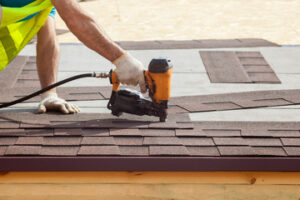A roofing company is a business that repairs and installs roofs. Its clients can be both commercial and residential. They often offer additional services such as window repairs and replacements.

They also provide detailed sales presentations to help their clients make informed decisions. Roofing Companies Winston Salem also offer warranties on their work.
There are several factors that affect the cost of roofing services. Some of these factors include the size and complexity of the roof, labor rates, and materials. Some contractors also offer financing to help customers afford their project. It’s important to do research before hiring a roofing company to ensure that you are getting the best price for your money.
Choosing a roofing contractor with experience is important because it means they know how to handle different aspects of the re-roofing process. They are able to anticipate problems and adjust their schedules accordingly. This helps them avoid delays and maintain their reputation in the industry. They also have the ability to make recommendations for additional services, such as gutter systems or skylights.
A roofing company with extensive experience can provide quality service and offer a competitive price. They can also offer warranties for their work. Moreover, they are in business for the long term, which allows them to build a solid customer base and retain their reputation in the roofing industry. They also have standing with manufacturers, which helps them offer substantial warranties on their products and services.
Before you hire a roofing company, it’s important to ask them for references from previous customers. You should also check online reviews to see if they have a good reputation. In addition, you should always choose a contractor that offers a free inspection and consultation. This will give you a chance to discuss the job with them and ask any questions that you may have.
Roofing contractors should invest in training and certification programs to enhance their skills and improve safety standards. This will ultimately result in better customer satisfaction and a positive reputation in the industry. They can also use innovative technology to streamline their operations and provide more efficient services to their customers. These technologies include software for project management and estimation, drones for roof inspections, and other cutting-edge tools.
Experience
A roofing contractor is an individual that specializes in the installation and repair of roofs. They may work alone or as part of a crew. They often are licensed with their state and bonded as contractors. In addition, they have experience in residential and commercial roofing. They also have the equipment to handle the job. Moreover, roofing contractors can provide services such as gutters and siding.
Depending on the type of roof, roofing contractors can specialize in sloped or flat roofing. They can also handle shingles or other materials such as clay tile, slate, concrete, or metal. Some even offer seamless gutter projects. The majority of these contractors are independent, but some may be employed by roofing companies. Those who are independent have a higher profit margin.
Experienced roofing contractors have a track record of high-quality work and customer satisfaction. These professionals can address the complexities of roof repair and replacement, and are skilled in negotiating with insurance companies. They also have the necessary tools to complete jobs in a timely manner and at competitive prices.
It is important for roofing contractors to stay up-to-date on technological advancements. They should look for innovative solutions such as software for project management and estimation, drones for roof inspections, and other technologies that improve efficiency. This will help them reduce operational costs and become more competitive in the industry.
Professional roofing companies usually have a support person who is onsite all day to answer questions and interface with the crew for you. In addition, they have a dedicated crew chief who manages the project and ensures that you are satisfied with the results. They may also have a warranty program that includes a lifetime workmanship guarantee.
The roofing industry is local and primarily dependent on the housing market and weather conditions. As a result, globalization is low and many companies are family-owned. These companies focus on the local market and build relationships with residential developers, building-services management companies, and industry suppliers to grow their businesses.
Some roofing companies are referred to as storm chasers and follow major storms. They have a sales presentation and use high-pressure tactics to get homeowners to sign contracts quickly. They also are willing to negotiate the price and will start with the highest priced option.
Warranties
Roofing warranties and guarantees provide peace of mind to homeowners, and they can protect against unforeseen expenses. These warranties and guarantees also help to set a contractor apart from the rest. Top-tier warranties often offer more comprehensive protection than standard warranties, and they may even include a no-dollar-limit warranty that protects homeowners from all costs associated with roof repairs. However, many homeowners have a minimal understanding of roofing warranties and can end up paying more than they should when repairs are needed.
The first thing to understand about a roofing warranty is that it covers only factory defects in materials. Manufacturer warranties typically cover shingles and can last up to 30 years, but they don’t cover workmanship or installation errors. Many manufacturers also offer extended warranties for additional coverage. However, these extended warranties require homeowners to work with a certified contractor and comply with specific requirements.
Another type of roofing warranty is a workmanship warranty, which covers the quality of installation work by the roofer. It will usually last for a shorter period of time than the manufacturer warranty, but it’s a good way to test out a company. In addition to a workmanship warranty, some companies will also offer a full-system warranty, which includes both material and labor.
While a warranty is an excellent investment, it doesn’t protect against everything that can happen to a roof over its lifetime. For example, a leak may occur due to poor design or a drainage issue. A leak is usually not covered by a manufacturer or workmanship warranty, and this damage could be costly.
A quality roofing company will be willing to back up their work with a strong warranty, and they will provide homeowners with a detailed contract outlining exactly what is and isn’t included in the warranty. This document will include the length of the warranty, whether it’s non-prorated and transferable to future homeowners. It will also explain any circumstances that could void the warranty, such as the failure to conduct routine maintenance. This will help you determine if the roofing company is worthy of your business.
Reputation
In the roofing business, reputation is crucial. Whether you want to attract new customers or retain existing ones, your reputation will play a significant role in your success. One savvy way to build your reputation is by showing off the positive reviews you receive from clients. In addition, you can also include customer testimonials on your website to boost your credibility.
A Roofing Company
One roofing company uses an engaging introductory video on its website to explain the value it offers to customers. The video is a great alternative to text explanations, which are typically less engaging. Moreover, videos are the best way to convey complex information in an easy-to-understand format. This roofing company clearly outlines its unique value proposition on its homepage: “Big enough to get the job done, but small enough to care.” This makes it easier for customers to decide if they are a good fit.
